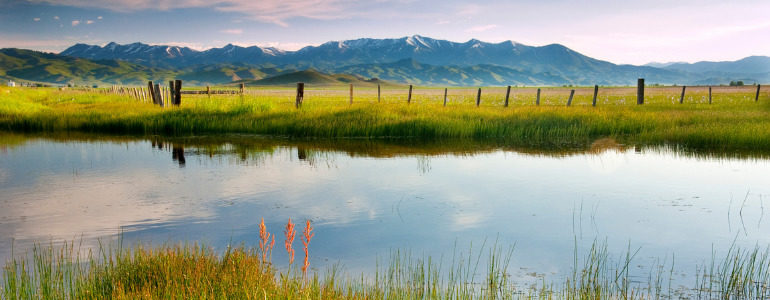Cultural Ecosystems in a Changing World: Building a Network Across the Northwest to Support Food Sovereignty, Climate Adaptation and Land Rights
Cultural Ecosystems in a Changing World: Building a Network Across the Northwest to Support Food Sovereignty, Climate Adaptation and Land Rights
Awarded Project Overview
April 2022
About the Project:
Indigenous communities worldwide are on the frontlines of climate change, facing disproportionate impacts due to historical and ongoing marginalization, land theft, and environmental degradation. In the Pacific Northwest, cultural ecosystems—such as clam gardens, forest gardens, and camas prairies—have sustained Indigenous food systems for millennia. These ecosystems not only provide food and medicine but also offer climate-adaptive benefits, like increased biodiversity and carbon sequestration. However, many of these practices have been suppressed, and Indigenous communities now face the dual challenge of revitalizing these systems while adapting to a changing climate.
This project, Cultural Ecosystems in a Changing World, aims to build a transboundary network across the Pacific Northwest to support Indigenous food sovereignty, climate adaptation, and land rights. By bringing together Tribes, First Nations, researchers, and land managers, the project will foster collaboration, share knowledge, and develop strategies to protect and restore these vital ecosystems.
Goals:
- Build a network to support the revitalization of cultural ecosystems and Indigenous food sovereignty.
- Identify and address the impacts of climate change on cultural ecosystems and Indigenous communities.
- Develop a shared research agenda and action plan to guide future collaborative efforts.
- Create educational materials and a digital platform to facilitate knowledge sharing.
- Train the next generation of leaders in cultural ecosystem conservation and stewardship.
Approach:
The project will convene a Salish Sea Cultural Ecosystems Knowledge Sharing Network through a series of three gatherings over the grant period. These convenings will bring together Indigenous leaders, researchers, and students to share knowledge, identify priorities, and develop actionable strategies. The first two gatherings will focus on defining the network and creating a research agenda, while the final gathering will showcase collaborative projects and outline next steps. The team will also develop educational materials, a digital knowledge-sharing platform, and mentorship opportunities for Indigenous youth and graduate students.
Research Focus:
- Assessing the impacts of climate change on cultural ecosystems and Indigenous food systems.
- Identifying and documenting cultural ecosystems across the Pacific Northwest.
- Exploring strategies for restoring and managing cultural ecosystems in a changing climate.
- Facilitating knowledge exchange between Tribes, First Nations, and researchers.
- Developing tools and resources to support Indigenous-led conservation efforts.
Why It Matters:
Cultural ecosystems are more than just sources of food and medicine—they are central to Indigenous identity, health, and resilience. Yet, these systems are under threat from climate change, land loss, and historical suppression. By revitalizing cultural ecosystems, Indigenous communities can reclaim their food sovereignty, strengthen their connection to the land, and build resilience to climate impacts. This project not only supports these efforts but also creates a model for collaboration that can be replicated in other regions.
Activities:
- Host three convenings to build the network and develop a shared research agenda.
- Visit cultural ecosystems, such as the Sts’ailes First Nation’s forest gardens, to learn from community-led restoration efforts.
- Create educational materials, including fact sheets and a digital knowledge-sharing platform.
- Mentor Indigenous youth and graduate students in cultural ecosystem conservation.
- Present findings and next steps at the Living Breath of wǝɫǝbʔaltxʷ symposium in 2023.
Expected Outcomes:
- A transboundary network of Tribes, First Nations, and researchers focused on cultural ecosystems.
- A research agenda and action plan to guide future collaborative projects.
- Educational materials and a digital platform to support knowledge sharing and advocacy.
- Strengthened partnerships and capacity for Indigenous-led conservation efforts.
- Mentorship opportunities for Indigenous youth and graduate students.
The team will share the project’s outcomes through:
- A final action plan and research agenda co-created with network participants.
- Educational fact sheets and a digital platform accessible to Tribes, First Nations, and the public.
- Presentations at the Living Breath of wǝɫǝbʔaltxʷ symposium and other academic and community forums.
- Collaborative publications and reports co-authored by Indigenous and academic partners.
In the News:
Stephanie Leon Riedl of the Sts’ailes First Nation cultivates traditional foods to pass on the lessons of the land to future generations.
Research Team:
Principal Investigators:
Charlotte Coté (Tseshaht First Nation), Professor, Department of American Indian Studies, University of Washington
Sara Gonzalez, Arts and Sciences, Anthropology
Brian J. Harvey, Assistant Professor in the School of Environmental and Forest, University of Washington
Community Lead: Joyce LeCompte, Camassia Resource Stewardship
Student: Katy Leonard-Doll, Master’s Student, Washington State University
Community Partners:
Alex McAlvay, Assistant Curator, Institute of Economic Botany, New York Botanical Garden
Chelsey Geralda Armstrong, Assistant Professor of Indigenous Studies, Simon Fraser University
Maurice Major, Washington Department of Fish and Wildlife and Cultural Landscapes Consulting
Linda Storm, Independent Ethnobotanist/Ethnoecologist and Wetland Ecologist for U.S. Environmental Protection Agency
Morgan Ritchie, Heritage Research Archaeologist, Sts’ailes First Nation
Stephanie Riedl (Sts’ailes First Nation), Sts’ailes Land and Planning Department
Gail Williams Gus (Tseshaht First Nation) Crisis Care & Wellness Coordinator, Tseshaht First Nation
Justine E. James, Jr., (Quinault Indian Nation), Cultural Resource Specialist, Quinault Indian Nation
Lia Frenchman, (Quinault Indian Nation), Tribal Historic Preservation Technician, Quinault Indian Nation
Elizabeth KingGeorge (Nooksack Indian Tribe), Consultant, Salish Sea Consulting
Warren KingGeorge (Muckleshoot Indian Tribe and Upper Skagit Tribe of Indians), Consultant, Salish Sea Consulting
Todd Mitchell – swəlitub (Swinomish Indian Tribal Community), Director, Swinomish Department of Environmental Protection
Jennifer Willup (Swinomish Indian Tribal Community), Swinomish Department of Environmental Protection

